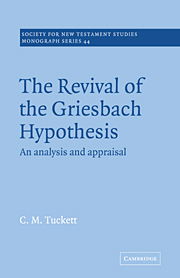Book contents
- Frontmatter
- Contents
- Acknowledgements
- Note on Abbreviations
- Introduction
- Part I Some Aspects of the History of the Study of the Synoptic Problem
- Part II General Phenomena
- Part III Some Particular Texts
- SECTION A SELECTED MARKAN PASSAGES: Introduction
- 9 The Healing of the Man with the Withered Hand
- 10 The Synoptic Tradition on Uncleanness
- 11 The Cleansing of the Temple
- 12 Tribute to Caesar
- 13 The Double Commandment of Love
- 14 The Woes against the Scribes and Pharisees
- 15 The Widow's Mites
- SECTION B THE DOUBLE TRADITION: Introduction
- 16 Wisdom Motifs in the Double Tradition
- 17 The Apocalyptic Discourses
- Conclusion
- Appendix
- Notes
- Abbreviations
- Bibliography
- Index
12 - Tribute to Caesar
from Part III - Some Particular Texts
Published online by Cambridge University Press: 18 January 2010
- Frontmatter
- Contents
- Acknowledgements
- Note on Abbreviations
- Introduction
- Part I Some Aspects of the History of the Study of the Synoptic Problem
- Part II General Phenomena
- Part III Some Particular Texts
- SECTION A SELECTED MARKAN PASSAGES: Introduction
- 9 The Healing of the Man with the Withered Hand
- 10 The Synoptic Tradition on Uncleanness
- 11 The Cleansing of the Temple
- 12 Tribute to Caesar
- 13 The Double Commandment of Love
- 14 The Woes against the Scribes and Pharisees
- 15 The Widow's Mites
- SECTION B THE DOUBLE TRADITION: Introduction
- 16 Wisdom Motifs in the Double Tradition
- 17 The Apocalyptic Discourses
- Conclusion
- Appendix
- Notes
- Abbreviations
- Bibliography
- Index
Summary
Farmer claims that ‘the question concerning tribute to Caesar affords a clear-cut test of the Marcan hypothesis as over against that of Griesbach’. He starts by pointing out what must have happened if Mark was the common source. Mark's version of the statement leading up to the opponents' question to Jesus (Mk. xii. 14a) includes four phrases. Matthew must have transferred the final phrase to be the second of the four, and also slightly re-worded it. Luke, on the other hand, must have kept Mark's order, but omitted the second phrase entirely, re-worded the first and third, and copied faithfully only the final phrase. Farmer claims that ‘there is no obvious explanation’ for Matthew's behaviour. Moreover, Luke's changes in wording in contrast to his faithful preservation of Mark's order, as well as his total omission of one phrase, ‘defy critical analysis’. Farmer also claims that the GH gives a much more adequate explanation: ‘Luke freely reused the text of Matthew in this instance, as he characteristically did: omitting a phrase here, rearranging the order of a phrase there, and frequently rewording the whole in a rather free manner … The whole is freely recast in a typical Lucan fashion.’ The transfer of the ‘way of God’ phrase to the end of the sentence is to stress this characteristically Lukan motif, and the omission of the ‘care for no man’ phrase is due to its redundancy in Matthew.
- Type
- Chapter
- Information
- Revival Griesbach Hypothes , pp. 120 - 124Publisher: Cambridge University PressPrint publication year: 1983

